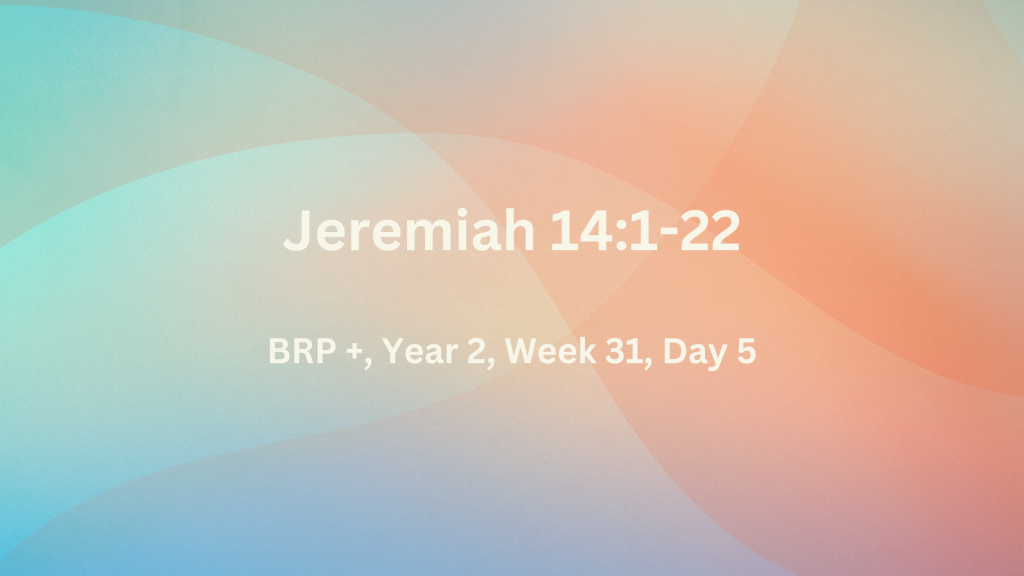Jeremiah 14:1-22
Q.1. How bad was the drought in Judah? Would the nation know why this was happening? How did Judah’s plight affect Jeremiah? What was insightful about his prayer? – (Jer.14:1-9)
God had promised Israel an abundance of rain, and bumper crops in the Promised Land, as long as they obeyed Him (c.f. Deut.28:12, 24; Joel 2:23). Even before God drove them out of the land, He sent a terrible drought. Jeremiah reported that – the ground is cracked for there has been no rain on the land (Jer.14:4 c.f. Jer.14:1-4). Even the wild animals suffered intensely (Jer.14:5-6). Sadly, the leaders still gave the people false hope (Jer.14:13-14). Jeremiah was heartbroken over the callousness of Judah. He could see that the nation was ripe for judgment – Although our iniquities testify against us, O Lord, act for Your name’s sake! Truly our apostasies have been many, we have sinned against You (Jer.14:7). He rightly identified the Lord as the – Hope of Israel, its Saviour in time of distress … (Jer.14:8). He saw God as a stranger in the land, Who is not able to save (Jer.14:8-9). However, Jeremiah made his appeal – … Yet You are in our midst, O Lord, and we are called by Your name; Do not forsake us! (Jer.14:9). Jeremiah believed that God was still on the throne despite the state of the nation, and that He was their only Saviour.
Q.2. Why was Judah experiencing the drought? What surprising response did God give the prophet? Would the people’s prayers make any difference? – (Jer.14:7-12 c.f. Jer.7:16; 11:14)
Jeremiah acknowledged that Judah’s iniquities testified against them, and that their apostasies have been many (Jer.14:7). The Lord brought the charge that – they have loved to wander; they have not kept their feet in check. Therefore, the Lord does not accept them; now He will remember their iniquity and call their sins to account (Jer.14:10). Somewhat surprisingly, God again advised Jeremiah not to intercede for the erring nation (Jer.14:11 c.f. Jer.7:16; 11:14). However, it does not seem that Jeremiah could detach himself from his own people so easily. God told the prophet that He will no longer respond to their cries, or their religious show (Jer.14:12).
Q.3. How did God answer the people’s objections raised by Jeremiah? What final appeal does the prophet make on behalf of Judah? – (Jer.14:12-22)
Jeremiah objected that the prophets had misled the people, by claiming that all would be well (Jer.14:13). The Lord confirmed that He never sent these false prophets – I have neither sent them nor commanded them nor spoken to them; they are prophesying to you a false vision, divination, futility, and the deception of their own minds (Jer.14:14). He reminded the prophet that He must punish the people – for I will pour out their own wickedness on them (Jer.14:16). Jeremiah was told to shed tears of sorrow for his people who would soon be crushed by the enemy (Jer.14:17-18). Jeremiah’s response was magnificent, as he refused to give up hope, despite the wickedness of the nation (Jer.14:19-20). He had longed for God’s intervention to revive the people and asked if God had completely rejected Judah (Jer.14:19). He pleaded – 21 Do not despise us, for Your own name’s sake; Do not disgrace the throne of Your glory; Remember and do not annul Your covenant with us. 22 Are there any among the idols of the nations who give rain? Or can the heavens grant showers? Is it not You, O Lord our God? Therefore, we hope in You, for You are the one who has done all these things (Jer.14:21-22).

